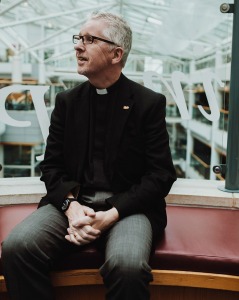Sheffield Cathedral. Easter 6, Evensong – 05.05.13
Readings: Zephaniah 3.14-end; Matthew 28.1-10, 16-end.
As the last Sunday of Easter before Ascension draws to a close, this evening’s second reading reminds us of the transition in the proclamation of the gospel of the kingdom that took place as the earthly ministry of Jesus ended.
In the first part of the reading we heard the account of an angel of the Lord appearing to the two Marys who had returned to the tomb. Terrified, but obedient to the angel’s command to go and tell the disciples had been raised from death and was going on ahead of them to Galilee, the women then met the risen Jesus, taking that experience with them to share with the disciples.
The two women clearly did a good job in persuading the disciples to go to Galilee, to the mountain where Jesus had directed them. The closing verses of Matthew’s gospel tell how they saw the risen Jesus there and worshipped him – though, interestingly, Matthew writes, ‘but some doubted’. Even an appearance of the risen Jesus himself was not enough for everyone. Seeing does not necessarily mean believing. Faith is a response of the heart, not just of the head.
Jesus then gives to the disciples the command that we know as ‘The Great Commission: ‘Go therefore and make disciples of all nations, baptizing them in the name of Father and of the Son and of the Holy Spirit, and teaching them to obey everything that I have commanded you. And remember, I am with you always, to the end of the age.’
Up to this point, Jesus’ ministry on earth had been restricted to an insignificant backwater of the Roman empire. The number of people that Jesus had come into contact with was relatively few. Being human has its limitations. The time had come for the ministry of Jesus to spread wider, and he was speaking to his disciples shortly before returning to the glory of heaven from which he came and the end of the restrictions of his humanity, more of which we will hear about at the Feast of the Ascension on Thursday.
In the commissioning of the disciples Jesus left them with a command and a promise: The command to go and make disciples; the promise that they would not have to do it alone. Through the power of the Holy Spirit whose coming we will remember again on Pentecost Sunday, Jesus would be with them – and with us – always.
Entrusted into the hands of those first disciples was a huge responsibility. To proclaim the good news of Jesus in all the world must have seemed an impossible task and it would have been beyond the disciples’ wildest imaginings that the followers of Jesus would one day be counted in hundreds of millions and present in every part of the earth.
When we read the stories of the disciples – the denial by Peter, the doubts of Thomas, the arguments between James and John – fragile, fallible people like us – it’s hard to imagine how the good news ever got beyond Galilee, let alone into all the world. But it did, and therein lies the reason to believe that we also have our part to play and that God will work though us also to make God’s love know to others.
There is a story of Jesus being asked a question by the angels after the commissioning of his disciples:
‘How will the world learn about you and know your love if you are not there?’
Jesus replied:
‘It’s alright, I’ve left things in the hands of my friends.’
Horrified, the angels said:
‘But surely you know how weak and frail humans are?’
Jesus said:
‘Yes. But I love them and trust them, and the Holy Spirit will strengthen them. I will be present in the world through them.’
Angels:
‘But what if they let you down? What is your alternative plan?’
Jesus smiled and said:
‘There is no other plan, my mission is in their hands.’
Another story tells of an enquirer from the Hindu religion who came to an Indian bishop. Unaided, he had read the New Testament. The story had fascinated him – in the Gospels about Jesus, his works and suffering; in the Acts about what the disciples of Jesus did and taught. The Church, he saw, continued the work of Jesus after Jesus had returned to his Father in heaven. The man converted to Christianity, deciding that he must belong to the community that carries on the life of Christ in the world, tirelessly seeking to make disciples of all people.
The Great Commission in Matthew’s gospel is a profound moment of transition, marking an end and a beginning in the ministry of Jesus: An end to the time when he lived in the flesh amongst his people and walked the hills and fields of Palestine; a beginning of the mission of his people to carry on his work by going out into the world to share his love abundantly and unconditionally. 2,000 years on we are inheritors of that same mission to make God’s love in Christ known.
I close with some words of St Teresa of Avila:
Christ has no body now on earth but ours;
ours are the only hands with which he can do his work,
ours are the only feet with which he can go about the world,
ours are the only eyes through which his compassion can shine forth upon a troubled world.
Christ has no body now on earth but ours.
